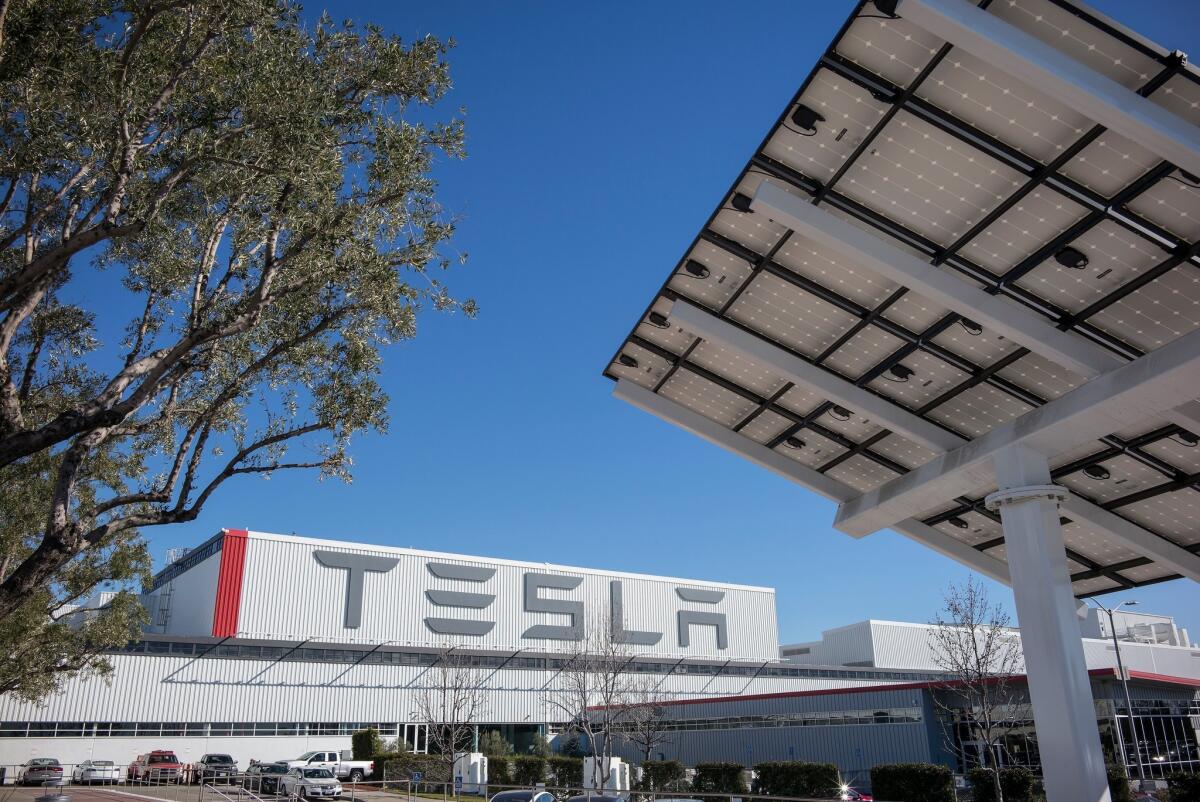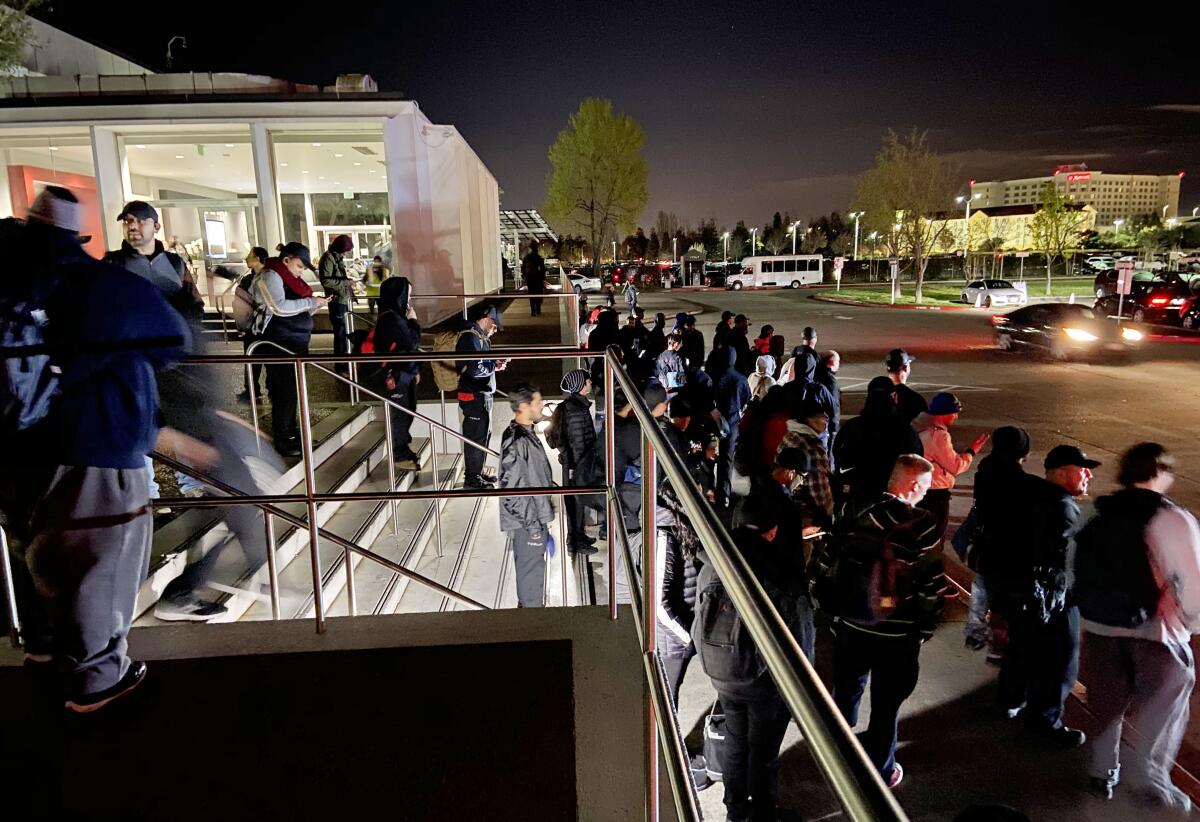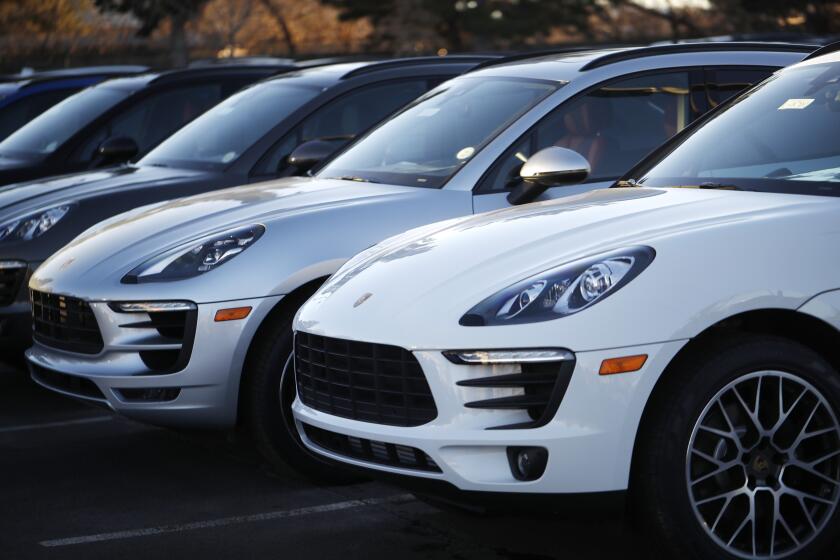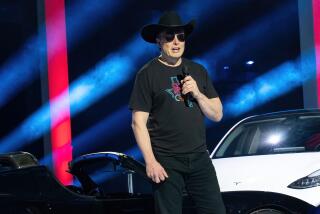Alameda County says Tesla has cut its workforce. But will it stop making cars?

- Share via
Tesla told Alameda County authorities Wednesday it has scaled back the workforce at its Fremont auto plant. But it was not clear what that means for the company’s production of electric vehicles.
The Palo Alto-based company has been operating the factory — which normally employs about 10,000 people, making model S, X, 3 and Y vehicles — this week despite a multi-county Bay Area lockdown order issued Monday to reduce the spread of coronavirus. Tesla told Alameda County Wednesday that 2,500 workers are now at the plant.
“We had a good conversation with Tesla today,” said Alameda County spokesman Ray Kelly. “They understand our position. The county explained they cannot continue their business as usual. They have to go on a minimum operations basis.”
The lockdown order allows companies to continue minimum basic operations, defined as payroll, security, and preservation of inventory value. That list does not include car making, Kelly acknowledged, and said “it sounds like they’re still making cars.”
Few doubt that the coronavirus will have a huge effect on car sales.
Tesla did not return calls for comment.
Asked what, if anything, the county would do if production continues, Kelly said, “Tesla is not going to decide what the law is.” Enforcement, he said, will be handled by Fremont Police.
The Times emailed police spokeswoman Gloria Bosques and asked how the department will assess Tesla compliance with the county order. She did not respond.
Earlier, Bosques referred the media to a statement on the police website, which reads in part: “We are currently communicating with legal counsel and coordinating with the County of Alameda, the Alameda County Public Health Department and Federal Government to better understand and interpret their guidelines in the face of a variety of other state and federal regulations.” It said nothing about Tesla.
In an email sent to factory workers at 8:49 a.m. Wednesday, Tesla human resources head Valerie Capers Workman said, “There are no changes in your normal assignment and you should continue to report for work if you are in an essential function” which she said include “production, service, deliveries, testing and supporting groups.” Sick workers could stay home and use their accumulated paid time off, she said.
She cited “conflicting guidance from different levels of government” on how to handle the coronavirus pandemic.
Workman didn’t detail conflicting government guidance, but in an email to employees early Tuesday morning she said “the federal government has directed that all National Critical Infrastructure continue to operate during this global pandemic,” which she said covers “business sectors crucial to the economic prosperity and continuity of the United States.” That includes auto manufacturing, she said, but didn’t include a source.
“People need access to transportation and energy, and we are essential to providing it,” she wrote.
Tesla Chief Executive Elon Musk had minimized what he called “panic” reaction to the virus on Twitter and in an email Monday night. In his email, Musk said, “My frank opinion is that the harm from the coronavirus panic far exceeds that of the virus itself,” and he said that COVID-19 cases “will not exceed 0.1% of the population.”
“I will personally be at work, but that’s just me,” he wrote, and ended the email with, “I’d rather you were at home and not stressed, than at work and worried.”

Thousands of workers streamed into the factory Tuesday, many arriving by bus.
More than a dozen employees sent messages to The Times complaining about Tesla’s failure to comply with the lockdown order. Several said they feared catching the virus and spreading it to family but also feared losing their jobs if they stayed home.
On late Wednesday afternoon, one worker who did not want to be identified for fear of losing her job said via a Twitter direct message that “all production still running” on the assembly line.
It’s not clear what impact a production shutdown would have on Tesla’s finances. At the end of 2019, the company reported having about $6 billion of cash. It raised $2 billion from the sale of new shares of stock a month ago, at $767 a share — more than twice the price that its shares currently trade at. (Tesla closed down 16% at $361.22 on Wednesday, down more than 60% from its all-time high of $917.42 on Feb. 19.)
The cash raise should provide a strong cushion, said Wedbush analyst Dan Ives. “That’s the best move they ever made, raising capital when they could,” Ives said. “If they hadn’t, we would be having a totally different conversation today about Tesla.”
While postponing production in Fremont would hurt, he said, “a shutdown is less of a longer-term concern than demand,” he said. “Right now, the average consumer is worried about their health, getting groceries and hand sanitizer, and they are not focused on buying cars.”
Tesla has a second factory in Shanghai, China, which has reopened after a coronavirus shutdown. But the pandemic has caused a crippling hit to auto sales in China, the world’s largest auto market, where overall sales were down 80% in February from the same month a year ago.
Other large automakers are temporarily shutting down U.S. plants in an effort to contain the coronavirus, Bloomberg reported. Ford will stop operations at all North American factories after Thursday evening shifts, according to a statement. GM and Fiat Chrysler also plan to idle factories, according to people familiar with the matter.
Honda Motor Co. said it plans to suspend North American production for six days. And Daimler AG told workers its Mercedes SUV factory in Alabama may have to close because of a shortage of parts coming from Europe.
More to Read
Inside the business of entertainment
The Wide Shot brings you news, analysis and insights on everything from streaming wars to production — and what it all means for the future.
You may occasionally receive promotional content from the Los Angeles Times.











